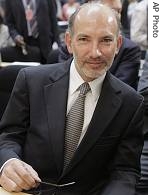-
(单词翻译:双击或拖选)
By Lisa Schlein
Geneva
17 September 2006
Human-rights organizations are calling for the U.N. Human Rights Council to protect the victims of abuse by naming and shaming those countries that violate their rights. On the eve of its second session, rights advocates are urging the Council's 47 members not to turn a blind eye to the world's most serious human-rights crises.
----
Unlike the first meeting in June, this one will get right down to business. There will be no high-level segment, no dignitaries expressing their views and hopes for this newborn organization.
 |
||
"Question of torture, children, rights of women. The need to protect human rights in the fight against terrorism, indigenous3 rights, etc. Those reports include specific recommendations on things that need to be done. A second set of reports refer to specific country situations," he said.
This will include the human-rights records of countries such as Somalia, North Korea, Cuba, Haiti, the Occupied Palestinian Territories and Sudan. Reports on the U.S.-run detention4 center for terror suspects in Guantanamo Bay and on the situation in Lebanon also will be presented.
An international coalition5 of 41 non-governmental organizations has issued a statement criticizing the council for failing to uphold democratic values. It accuses the U.N. body of the kind of politicization that stripped the U.N. Human Rights Commission of its moral authority.
The executive director of the rights group U.N. Watch, Hillel Neuer, says he welcomes the investigators' reports, but adds reports are not enough.
"I am actually not aware of a single country that is preparing to introduce any resolution for Darfur or the victims of any other violation," he noted6. "Now that is deeply disappointing. We need resolutions that single out violations7 in countries like North Korea, Burma, Cuba, China, Saudi Arabia, etc. The message that has gone out to the world is that the first three months of the council, not a single country is being addressed except for the anti-Israel resolutions."
Neuer is referring to two special sessions held by the council that concerned Israel's attack on Gaza and the invasion of Lebanon. Ambassador de Alba calls the special sessions fully8 justified9 because they dealt with critical human-rights issues.
"I think the Council should fight selectivity. But, selectivity does not mean not to address an issue. It means to address any relevant issue," he continued. "The criticism that has come with stronger voices in terms of the balance that the resolutions need to have."
Some governments and rights groups criticize these resolutions as being entirely10 one-sided. They say Israel is politically condemned11, but no mention is made of provocative12 actions committed by either the Palestinians or Hezbollah militia13.
 收听单词发音
收听单词发音
1
investigators

|
|
| n.调查者,审查者( investigator的名词复数 ) | |
参考例句: |
|
|
|
2
defunct

|
|
| adj.死亡的;已倒闭的 | |
参考例句: |
|
|
|
3
indigenous

|
|
| adj.土产的,土生土长的,本地的 | |
参考例句: |
|
|
|
4
detention

|
|
| n.滞留,停留;拘留,扣留;(教育)留下 | |
参考例句: |
|
|
|
5
coalition

|
|
| n.结合体,同盟,结合,联合 | |
参考例句: |
|
|
|
6
noted

|
|
| adj.著名的,知名的 | |
参考例句: |
|
|
|
7
violations

|
|
| 违反( violation的名词复数 ); 冒犯; 违反(行为、事例); 强奸 | |
参考例句: |
|
|
|
8
fully

|
|
| adv.完全地,全部地,彻底地;充分地 | |
参考例句: |
|
|
|
9
justified

|
|
| a.正当的,有理的 | |
参考例句: |
|
|
|
10
entirely

|
|
| ad.全部地,完整地;完全地,彻底地 | |
参考例句: |
|
|
|
11
condemned

|
|
| adj. 被责难的, 被宣告有罪的 动词condemn的过去式和过去分词 | |
参考例句: |
|
|
|
12
provocative

|
|
| adj.挑衅的,煽动的,刺激的,挑逗的 | |
参考例句: |
|
|
|
13
militia

|
|
| n.民兵,民兵组织 | |
参考例句: |
|
|
|















